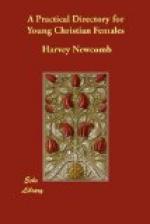VIII. Charity thinketh no evil—is not suspicious—does not lay up slight expressions or equivocal conduct, and reason out evil from them, and suffer it to corrode and sour the mind against an individual; but puts the best construction upon the words and conduct of others that they will bear, not yielding to an ill opinion of another, but upon the most indisputable evidence. There is, perhaps, no more fruitful source of disquiet and unhappiness, both to ourselves and others, than a suspicious disposition. “Jealousy,” says Solomon, “is cruel as the grave: the coals thereof are the coals of fire, which hath a most vehement flame.” Nor is this language too intense. A jealous person always sees a “snake in the grass.” He is afraid to trust his most intimate friend. He puts the worst construction upon the language and conduct of others that they will bear: hence he conceives himself grossly insulted, when no ill was designed; and a gentle rebuke, or a good-humored repartee, constitutes an unpardonable offence. He always looks on the dark side of human character, so that a single foible or one glaring fault will eclipse a thousand real excellences. He is always complaining of the degeneracy of the times, and especially of the corruption of the church; for he can see nobody around him who is perfect, and therefore he comes to the conclusion that there is very little piety in the world; forgetting that, were he to find a church of immaculate purity, his own connection with it would introduce corruption. Should such a person conceive it to be his duty to tell you all your faults, woe betide you! for desirable as self-knowledge is, it is no kindness to have our faults aggravated a hundred-fold, and concentrated before our minds like the converging rays of the sun, in one focal blaze, nor poured upon our heads like the sweeping torrent, nor eked out like the incessant patterings of a drizzling rain. Thus did not Paul. When he felt it his duty to reprove, he was careful to commend what was praiseworthy,




